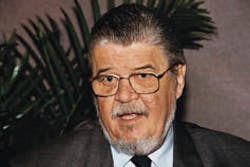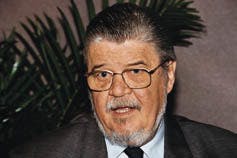Market solution for Brazil's oil and gas sector
ANP to stimulate competition, discipline activity
Giovanni Toniatti, National Petroleum Agency Director.One of the five directors of Brazil's new National Petroleum Agency (ANP), Giovanni Toniatti, is a geologist with 35 years experience in various private and government positions in the petroleum sector and is the director with the closest contact with the upstream sector. Following are excerpts from the interview he granted Offshore Magazine:
Offshore: What is happening in the Brazilian economy and what is the ANP?
Toniatti: In basic terms, the Brazilian government is getting out of the role of being a businessman and providing a market solution in the oil and gas sector. In doing this, it has to put a regulating agent in place to discipline the activity in order to stimulate competition, as much as possible, and protect consumers. That is the ANP's task and it is quite a broad one in that it really will manage the entire oil sector, both upstream and downstream. Our mandate is to monitor and regulate the industry and gradually introduce free market rules to the sector.
Why are these changes happening now?
In the first place, because today we have democratic institutions and nothing could be more natural than an opening of the market with autonomous watchdog agencies.
What will be the ANP's priorities?
As of the moment the technical task of approving Petrobras' blocks was concluded, the ANP's newest job in the upstream sector is to define the blocks to be put out for tender. In a first stage, we will be working basically with those blocks requested by Petrobras. Subsequently, we will work with "nominated areas." The market will tell us which areas are interesting, so that we can identify them and go through a tender process.
Is this second one going to be a round of bidding, or will companies be able to come knocking on the ANP's door when they feel like it?
They can knock on the door when they feel like it, but we will decide when the tender will be held. A seismic company comes along and asks for our authorization to conduct an "on spec" survey. Then they sell it to Esso, Shell, or whoever. Then, these companies come to us and want us to put the area up for tender. At that point, we prepare the area, or areas, for tender, providing the speculative survey information together with any other information that is available, such as previous surveys conducted by Petrobras. The tender information is open to all comers, not just to the company that made the original request. Each one studies the package of materials and comes to its own conclusion about the area on offer, and makes its bid.
If this will be the second round of bidding, then you plan to continue with a third and a fourth and so on?
Yes. Because we are going to have other areas that we call "relinquished" areas. This is because Petrobras, for example, will return a certain percentage of its exploration areas, at least theoretically. Of those, perhaps half could be put out again for tender. It becomes a routine.
What's the timing on all this?
For the first round, we are in the process of hiring an international promoting agent. We want this first round to be finished by next spring. We still do not know if it will be only offshore or a mix of offshore and onshore.
And the second?
There will be at least one on a yearly basis. Possibly there will be large annual bidding rounds, as long as there are enough projects to be able to do this, with small bids interspersed for the smaller areas. This could be for regeneration areas that Petrobras prefers to give up instead of calling in a partner to help out.
What are the next stages, now that Petrobras has signed (August 6) its concessions?
There are the contracts for production and for development, where letters of intent for partnerships between Petrobras and prospective partners exist, but the process has to pass through ANP. It's a group of 368 contracts in total and have to be handled one by one. And then the question of government take is still open.
Petrobras wanted 10.5%, ANP gave 7.1%
Among the first significant and concrete steps taken by the National Petroleum Agency (ANP) was the division of the sedimentary basins between Petrobras and the areas left for upcoming exploration and production (E&P) concession rounds. David Zilbersztajn, General-Director, announced the division of basins.ANP kept 93% of the total and will start making it available for concession rounds. Petrobras retained only 7.1%, but that included just about all of the producing areas, 99% of the country's known reserves, and all the areas for which it is negotiating partnership projects.
For its part, the ANP stressed that it reduced the Petrobras requested exploratory areas by 20% in Campos. The agency now holds 48% of the Campos Basin, which is a likely priority area for offer in upcoming concession rounds.
Tenders by year-end
Brazil's first open bids for E&P concessions - not to be confused with Petrobras partnerships - are being prepared by the ANP and bids have been called to select an international consulting company to prepare this process.Agency director Ricardo Pinto Pinheiro said: "Those first tender offers will be opened by the end of December 1998, and the first E&P concession contracts will be signed by the end of April 1999." He said oil companies would have 4-6 months to prepare their bids.
Copyright 1998 Oil & Gas Journal. All Rights Reserved.

